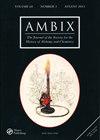2023年帕廷顿奖
IF 0.6
3区 哲学
Q3 HISTORY & PHILOSOPHY OF SCIENCE
引用次数: 0
摘要
本文章由计算机程序翻译,如有差异,请以英文原文为准。
The Partington Prize 2023.
The Society for the History of Alchemy and Chemistry is delighted to announce that the winner of the 2023 Partington Prize is Dr Armel Cornu of the Science History Institute for her entry “Senses and utility in the New Chemistry.” Armel Cornu is a postdoctoral researcher at the Science History Institute in Philadelphia. She majored in chemistry and history before graduating with a masters degree in the history of science at Université Panthéon-Sorbonne in Paris. She obtained her doctorate at the University of Uppsala in 2022 with a dissertation centring on the market, regulation, and science of mineral waters in eighteenth-century France. Her research is characterised by a social and economic approach to the development of chemistry throughout the Enlightenment. She currently works on the uses of sensorial impressions in the practice and perception of eighteenth-century chemistry. The Society for the History of Alchemy and Chemistry established the Partington Prize in memory of Professor James Riddick Partington, the Society’s first Chairman. It is awarded every three years for an original and unpublished essay on any aspect of the history of alchemy or chemistry. The prize-winning article will appear in the Society’s journal, Ambix, in due course.
求助全文
通过发布文献求助,成功后即可免费获取论文全文。
去求助
来源期刊

Ambix
HISTORY & PHILOSOPHY OF SCIENCE-
CiteScore
0.80
自引率
60.00%
发文量
42
审稿时长
3 months
期刊介绍:
Ambix is an internationally recognised, peer-reviewed quarterly journal devoted to publishing high-quality, original research and book reviews in the intellectual, social and cultural history of alchemy and chemistry. It publishes studies, discussions, and primary sources relevant to the historical experience of all areas related to alchemy and chemistry covering all periods (ancient to modern) and geographical regions. Ambix publishes individual papers, focused thematic sections and larger special issues (either single or double and usually guest-edited). Topics covered by Ambix include, but are not limited to, interactions between alchemy and chemistry and other disciplines; chemical medicine and pharmacy; molecular sciences; practices allied to material, instrumental, institutional and visual cultures; environmental chemistry; the chemical industry; the appearance of alchemy and chemistry within popular culture; biographical and historiographical studies; and the study of issues related to gender, race, and colonial experience within the context of chemistry.
 求助内容:
求助内容: 应助结果提醒方式:
应助结果提醒方式:


